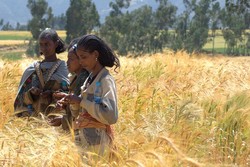
Study of cases of large-scale land deals in Ethiopia finds range of negative impacts on local families and women in particular, including reduced access to land for farming and grazing, outmigration, and reduced availability of forest products.
Gendered impacts of large-scale land acquisitions in Western Ethiopia
by Forests and Livelihoods: Assessment, Research and Engagement (FLARE)
This study presents the results of a comparative assessment of the effects of four cases of land transactions in western Ethiopia in the states of Oromia and Benishangul-Gumuz. The study contributes to the larger body of research on large-scale land transactions. It does so through a particular focus on how these transactions are affecting women and women’s livelihoods in comparison to those of men.
The study identifies four consistent outcomes across the studied cases:
(1) They reduced available land and parcel sizes for agricultural households;
(2) They reduced available grazing area, livestock holdings, milk consumption/sale, and availability of other livestock products;
(3) They prompted out-migration and increased labor requirements from women who came to manage both their normal domestic chores but also had to take address new tasks outside the home;
(4) Finally, they reduced available forest area and forest products such as firewood and non-timber goods, again increasing the labor burden of women. Preliminary evidence of changes in nutrition and diets point to an important avenue for future research.













